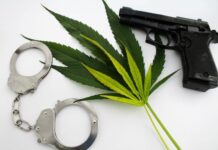America is in the throes of a major crisis. Opioid addiction has taken over many parts of the country and is taking a number of lives daily. The opioid crisis is at its breaking point right now. More people are spending time in hospitals or losing their lives to opioid overdose than ever before. According to the National Institute on Drug Abuse, 47,600 opioid overdose deaths occurred in the United States in 2017. That staggeringly high number has skyrocketed up from only 8,048 overdose deaths in 1999. More Americans are addicted to opioids now than at any other time in the country’s brief history. In the face of a crisis of epic proportions, government officials, members of law enforcement, and those affected personally by addiction are searching for any and all solutions. There is an increasing amount of evidence that suggests one of the ways to limit the scale of the opioid crisis is medical cannabis legalization.
How Medical Cannabis Relates to Opioid Addiction Rates
Of the studies comparing cannabis and opioid use, the most important evidence suggests states with legal medical cannabis programs have lower opioid use and overdose rates. A study released by Drug and Alcohol Dependence found that, “Medical marijuana legalization was associated with 23% and 13% reductions in hospitalizations related to opioid dependence or abuse and opioid related overdose, respectively.”
While surprising to some, the idea of cannabis lowering opioid overdose and opioid related hospitalizations makes sense. Many patients in states where medical cannabis is an option would much rather choose the natural, plant based medicine instead of strong and incredibly addictive opioids. The risks involved with consuming cannabis to treat conditions from chronic pain to insomnia are drastically lower than those associated with long term opioid use and addiction. There have been zero documented cases of cannabis related overdose deaths while there are 130 opioid overdose deaths a day in the United States, according to the National Institute on Drug Abuse.
There are obviously risks to over-consuming cannabis, but those risks pale in comparison to what occurs during an opioid overdose. When cannabis is consumed at higher doses than recommended, symptoms may include paranoia, nausea, and drowsiness. Luckily, those symptoms typically wear off within 2-4 hours. If opioids are consumed at unsafe doses, as is often occurs when people use non-prescription opioids like heroin, symptoms can include respiratory failure, slow breathing, unresponsiveness, and in the worst cases, death.
Opioids and Medical Cannabis Must Be Further Researched
Though initial findings suggest a correlation between the legality of medical cannabis and a drastically lower rate of opioid related hospitalizations and opioid related deaths, the amount of evidence that has been released to the public at this point is far too limited.
Considering the amount of time and money that is being invested in understanding how to limit the devastating effects of the opioid crisis in America, it seems important that more of that research effort be put into studying the relationship between medical cannabis legalization and opioid use. The previously mentioned Drug and Alcohol Dependence study found, “Medical marijuana policies were significantly associated with reduced OPR-related hospitalizations but had no associations with marijuana-related hospitalizations.” It concluded stating, “Given the epidemic of problematic use of OPR, future investigation is needed to explore the causal pathways of these findings.”
Where cannabis for medicinal use fits into reducing the negative outcomes of the opioid crisis is up to researchers to understand. The evidence that has been initially provided does shed some light on the potential cannabis has as a replacement for opioids in some cases. However, it is important for further research to be conducted before blanket statements about its effectiveness are made and before doctors begin prescribing it as a replacement for opioids.
Saving People From Addiction to Opioids
The most obvious way to save lives from opioid overdose is to keep people from falling into the grips of opioid addiction in the first place. Though in many cases, severe bouts of pain, whether acute or chronic, require the prescription of a strong opioid to relieve a patients suffering, many opioid prescriptions are unwarranted. In those less serious cases, a pain reliever of lesser strength with a lower likelihood of addiction is a far more safe and effective option. Cannabis has the potential to be that more safe option. A clinical review of cannabis and pain found that, “Whether cannabis is the best treatment for pain or not, many patients around the world believe that cannabis has helped them with their pain.”
Anecdotal support from patients for the use of cannabis to treat pain is nearly as important as clinical studies proving its effectiveness in doing so. Patients often know best when it comes their own bodies and what best treats the pain that they are suffering from. Patient support for cannabis as a treatment for pain should be enough for the rest of the United States to allow doctors to legally prescribe cannabis for pain as they see fit.
The opioid crisis is getting worse everyday. As more people lose their lives to addiction and overdose, the government and medical community will continue to search for answers. Whether or not medical cannabis is one of those answers is not yet fully understood. However, the evidence, limited as it may be, does suggest that it may just be one of the ways to limit the symptoms of the opioid crisis.

Lane is based in Southern California and is a content curator for Medical Marijuana 411. He spends his free time playing guitar and walking on the beach. He focuses his research into finding informative stories that can help medical marijuana patients better understand their diverse medicine.











